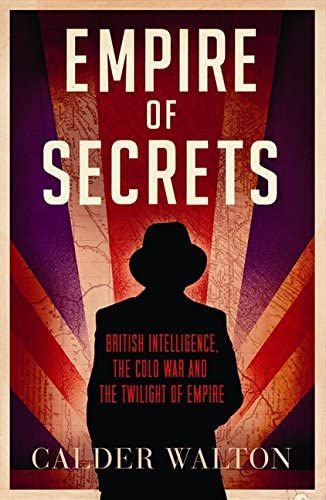
Compared to Tim Milne's warm, emotional, and deeply personal book, British Intelligence by Cambridge historian Calder Walton is a rare piece of intellectual coolness and aloofness. In contrast to the bright polemicists who proved the moral impeccability of the British Empire (the first of them, of course, Niall Ferguson with his famous "Empire"), or, on the contrary, who left its purely harmful nature (like Ian Cobain in his "Cruel Britain"), Walton takes emphatically neutral, nonjudgmental position. He does not deny the greatness of Britain, but he does not exalt it either; does not mourn the collapse of the empire, but does not rejoice over it either. And although in this restraint, of course, there is a large element of drawing, the author plays his role well.
In Empire of Secrets, pioneering intelligence historian Calder Walton reveals how Britain contributed largely silently yet stunningly effectively to the Cold War effort, their victories as invisible to the larger world as their defeats. Mining recently declassified intelligence records, Walton uncovers this missing link in Britain's post-war history.
The first thing that the Russian reader should know is that the Russian title misleads him: Walton’s book (in the original it is called The Empire of Secrets) is not about the Cold War period as a whole, and it is not the Cold War at all that is in the focus of the author’s book. attention. Walton's subject is the collapse of the British Empire and the role that the British intelligence services played (or rather did not play) in it.
Formally, Walton takes 1909 as a starting point, when British intelligence was formed institutionally, and, accordingly, its activities became, if not public, then at least described, separated from the activities of other units. The author goes on to describe, quite accurately, both the brilliant and the failed secret service operations during the two world wars. Some, like the homeric tale of a special unit of specially trained interceptor falcons that were supposed to kill "suspicious-looking pigeons" in 1939, read like good examples of English satire. Others, like the story about the dizzying scheme of disinformation that British intelligence used during the landings in Sicily (a dead body in an officer's uniform with a briefcase full of secret documents was planted on the Germans) look like strong genre prose. Walton also writes about the delightful counterintelligence mess that Tim Milne faced - however, in his presentation, this chaos looks much more dangerous and less pretty. And yet, Walton's book becomes truly fascinating from about the second third, when it comes to the last years of the life of the British Empire.
With the same melancholic detachment, Walton talks about the systematic mistakes that British intelligence made between the late 40s and the mid-60s of the 20th century (according to the author, this historical moment can be considered the real end of the empire). The total inability to cope with the terrorist threat emanating from the fighters for the independence of Israel, and the disaster at the King David Hotel, which cost the lives of almost a hundred people. A gross miscalculation during the Suez crisis, which led to a cooling in relations with the United States. The mass torture used by intelligence officers during the Mau Mau uprising in Kenya, which did not bring any result, but caused widespread public indignation ... For one successful operation, the British have a dozen unsuccessful ones, and if we leave aside the exploits of James Bond, then the entire post-war history of the British intelligence agencies looks like one continuous and varied fiasco.
It is no coincidence that Walton limits his narrative to the mid-60s - everything that happened later, not only goes, strictly speaking, beyond the scope of his research, but on the whole cannot yet be studied in any way thoroughly. Mi-5 and Mi-6 continue to keep their secrets, most of the documents are classified, and even on such high-profile precedents as the murder of Patrice Lumumba (apparently, his death was the work of the English spy Daphne Park, the main prototype of Em from the James films Bond, played by Judi Dench), there is no official clarity. Nevertheless, the conclusion that the author comes to even on this limited chronological material is quite timeless and very relevant: any state that overly relies on its special services (as the UK did for most of the 20th century) inevitably pays dearly for this your habit. And it's not even that the special services are somehow specially bad - no, they are quite good. They just need to know their place - and the place is not high.
This article was sponsored by Archana Modha
Comentarios